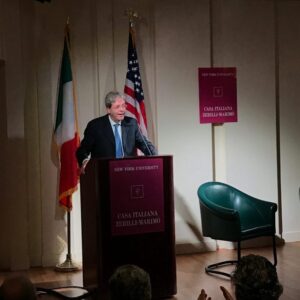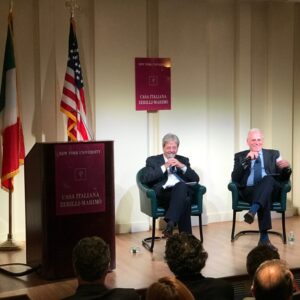Esteemed Prime Minister Gentiloni,
I was one of the general public attendees who stood outside in the rain at NYU’s Casa Zerilli-Marimò on Tuesday, September 19, so that I would have the privilege of hearing you speak about “Reforming Italy in a Changing World.” Outside, an Italian, a gentleman and an artist (with an umbrella), joined me in line offering me a respite from the last of the summer rain. Inside, another Italian, also a gentleman but this time a politician (yes, you, Mr. Prime Minister), offered us a respite from the ongoing political climate in America.
The last sitting head of Italian government I heard speak was Giulio Andreotti, when my alma mater, University of Toronto, bestowed upon him an honorary degree in 1992. I was very young and naïve at that time, and I was in awe of the leader that he was professed to be. Then the other night, when Dr. Albertini mentioned you were making history, being the first sitting head of government to visit NYU since Andreotti, I was delighted by the coincidence with my personal history, and somehow, that alone made standing in the rain less unpleasant.

When you addressed the audience, I was struck by many things, and being older and less naïve, I must say, that your presentation and the ensuing Q&A was impressive. First, I commend you on your strong command of English (impeccably aristocratic, it has been called), not only during your prepared talk, but also when responding to the questions posed by the public. As a professor of foreign languages, it is always refreshing to see a person in power who, in addition to being skilled in having cohesive and logical discussions in his native language, is equally capable of doing so in other languages also (something at which your predecessor was much less successful).
Next, I commend you for tackling not only the issue of the “brain drain” that is so prevalent in Italian society, especially its young people, but also your willingness to address the higher education system in Italy. As a professor, I strongly agree with your comment about the need for Italy’s youth to leave Italy and enrich their academic formation by studying abroad. I encourage my American students to do the same, to extract themselves from their comfort zones and explore new ways of learning and living outside of the U.S.
You articulate that one of the directions the Italian government would take to solve the issue of the “brain drain” is by making investments in scientific research and university systems in Italy. The other is to make Italian universities more attractive to foreign students. You say you would like to see a larger contingent of foreign students attend Italian universities, which you uphold to be excellent. Dr. Albertini concurs. Actually, I would be hard pressed to find anyone present who would disagree with the statement that Italian universities are excellent – after all, Italy is the home of the University of Bologna, which is the world’s oldest university.

Higher education is a topic that I have been personally researching of late, and I truly wished this part of the discussion could have been further development and discussed by the academics and students present. There is so much more that we could have explored together. I have no doubt that you are familiar with the recently released 2018 Times Higher Education (THE) World University Rankings, to illustrate the position of Italian universities in the global ranking. It compares universities worldwide according to teaching, research, citations, industry income, and international outlook. Of the Italian universities, 39 appear in this ranking, with only two in the top 200.
Italy’s number one ranked university, according to THE (Times Higher Education) ranking, is the Scuola Superiore Sant’Anna, which we find tied at position 155 with TU Dresden and Ulm University (both in Germany). How does the world’s oldest university rate? Actually, it doesn’t. According to THE, it falls between 201-250…there isn’t an actual ranking given to it. And your comments about the Politecnico di Milano (which ranks in the top 100 for its Engineering & Technology, and Computer programs) falls into the 301-350 category overall. You are absolutely correct about its high foreign student contingent, 14% of the entire student population (that high percentage can be found only at two other institutions, Sant’Anna and the Polytechnic of Turin, the latter places between 401-500 in the ranking).
So yes, your government is absolutely correct to address the Italian university system and make it more attractive to international students (as well as Italian students). Yes, appeal to more students coming from Mediterranean countries, in particular Arab countries, African countries and Balkan countries, as you identified in your response. All this is important to the evolution of Italian universities and is essential for forming Italy’s future. However, let’s not take away from the academic excellence for which Italy is known…it is culture and knowledge par excellence. Initiatives in this direction are already being made and those who watch this Ministry of Foreign Affairs – Farnesina video would acknowledge the invaluable contributions of Italians globally, and perhaps might even consider studying in Italy.
The know-how of Italians from the beginning of history itself cannot be separated from language — Italian is considered the language of angels (according to Thomas Mann), the most romantic language (according to the Today’s Translations survey of 320 linguists), and, for the French, the sexiest language (according to a Babbel recent survey). Moreover, recent statistics demonstrate that there has also been an increase in the study of Italian for employment-related reasons.
You talked about the polemics of the English only degrees offered at the Polytechnic of Milan in certain areas of study. Yet, in February 2017, the Constitutional Court ruled that universities cannot offer degrees entirely in English. Yes to internationalization but no to sacrificing the Italian language in the name of internationalization. I whole-heartedly agree with the ruling, and I say this as a professor of Italian. I say this as the daughter of Italian immigrants. I say this as a member of one of the largest Italian communities outside of Italy.
In closing, I would like to reiterate what an honour it was to hear you address the intimate Italian gathering at NYU’s Casa Zerillo-Marimò about reforming Italy. As this reformation occurs, I would hope that initiatives and goals of your government and subsequent governments look outward aspiring toward a more international and equitable Italy, but not at the cost of Italians and la bella lingua.
Respectfully,
Enza Antenos, Ph.D.











